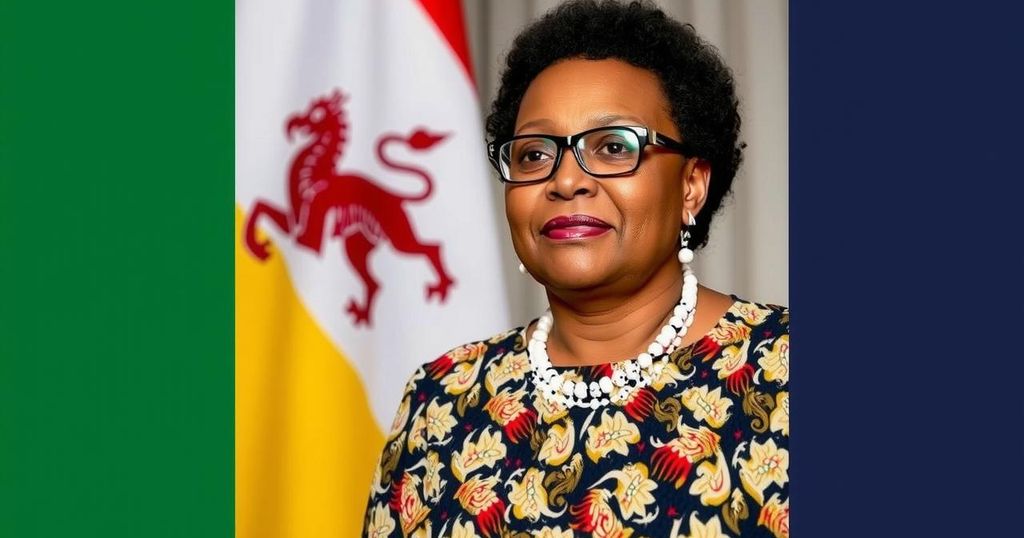Netumbo Nandi-Ndaitwah has made history as Namibia’s first female president, winning over 57% of the vote. A long-time member of Swapo, Nandi-Ndaitwah has a rich history as an activist, having fought against apartheid and served in various ministerial roles advocating for women’s rights. Despite her electoral success, her victory has been contested by rival Panduleni Itula, who claims the election was flawed, leading to potential legal challenges.
Netumbo Nandi-Ndaitwah, commonly referred to as NNN, has etched her name in history by becoming Namibia’s inaugural female president. At 72 years old, she garnered over 57% of the vote in the recent election, outperforming her closest competitor, Panduleni Itula, who received 26%. This remarkable achievement is a milestone in Nandi-Ndaitwah’s life, which has been filled with significant events, including her struggles against oppressors, her time in exile, and her rise as a notable figure in Namibian politics.
Despite her victory, Itula has contested the election results, labeling them as “deeply flawed,” with his Independent Patriots for Change (IPC) party planning to pursue legal action to challenge the outcome. A long-standing member of the ruling party, Swapo, Nandi-Ndaitwah has vowed to spearhead Namibia’s economic transformation. Born in 1952 within the confines of the Onamutai village as the ninth of thirteen siblings to an Anglican clergyman, she became politically aware at a young age, joining Swapo at 14 during its early efforts against South African colonial rule.
Her political journey involved her initial engagement in mitigating apartheid’s impacts, where she developed into a leader within Swapo’s Youth League. Nandi-Ndaitwah has stated, “Politics came in just because of the circumstances. I should have become maybe a scientist,” illuminating her unexpected but fervent commitment to political activism. Her activism led to her arrest during a crackdown on Swapo supporters, prompting her exile and continued organization in Zambia and Tanzania, subsequently transitioning to academic pursuits in the UK.
Following Namibia’s independence in 1988, Nandi-Ndaitwah returned and took on various roles within the newly established government, becoming a staunch advocate for women’s rights. One of her significant legislative successes includes the passing of the Combating of Domestic Violence Act in 2002, a testament to her commitment to challenging gender discrimination within the political framework. Her resilience overcame the traditional male-oriented political culture, leading to her recent appointment as vice-president in February, succeeding Nangolo Mbumba after the passing of former President Hage Geingob.
In her personal life, Nandi-Ndaitwah is married to Epaphras Denga Ndaitwah, a former chief of the Namibian defence forces, and they have three sons together. Her leadership style has been characterized by a hands-on approach, famously stating, “I am an implementer, not a storyteller.” Nandi-Ndaitwah’s story encapsulates a legacy of steadfast dedication to her country, illustrating unwavering resilience in the face of adversity.
Netumbo Nandi-Ndaitwah’s journey from a young freedom fighter in a politically volatile Namibia to the first female president is significant within the context of the nation’s history. Her early involvement with the Swapo party at the tender age of 14 laid the foundation for her political career amidst South African colonial rule. Nandi-Ndaitwah’s activism not only contributed to the independence of Namibia in 1988 but also paved the way for heightened female political representation in a traditionally male-dominated landscape. Her background as a promonent advocate for women’s rights, coupled with her extensive ministerial experience, has positioned her as a transformative figure in Namibian politics, emphasizing the importance of women’s empowerment in governance.
Netumbo Nandi-Ndaitwah’s election as Namibia’s first female president marks a pivotal development in both her life and the nation’s history. Her commitment to women’s rights and economic advancement illustrates her vision for a progressive Namibia. Challenges to the election results posed by her rival underscore ongoing debates about electoral integrity, yet her extensive political legacy reflects a journey from struggle to leadership, solidifying her role in shaping the future trajectory of the country.
Original Source: www.bbc.co.uk







